The room is dark except for a fire in the oven and a single, shaky petroleum lamp that lends the air its smell. I sit on the makeshift bed, watching the burly grandmother of the house cook Turkish coffee above a wood-fired oven while the rest of the family is huddled up across the room. We just finished a meal of home-baked bread, smoked cheese and fresh cucumbers. It feels, smells and looks like a moment out of a different time.
We are in Pankisi, in the north-eastern part of Georgia, bordering with Ingushetia, Chechnya, Dagestan and Azerbaijan. Never heard of Pankisi? Here is a quick introduction:
We strongly advise you not to travel to […] the Pankisi Gorge north of Akhmeta because of the threat of terrorist and criminal activity, and due to the danger of unexploded ordnance remaining from the conflict in 2008. While military operations in Georgia have ceased, tensions remain.
– Australian Government, Department of Foreign Affairs and Trade, January 2014
To be fair, only the Australian and New Zealand governments still issue warnings for the Pankisi Gorge. All other nations have lifted their warnings for the region. Dewi, my trusted tour guide, says it’s ‘safe’ (I mentally correct that to ‘safe enough’). I didn’t specifically plan to come here, but when Dewi suggested it as an itinerary that would take me to places where tourism is a near unknown concept, I practically had no choice but to say yes. And here I am in the middle of Kist people – who migrated from Chechnya some 150 years ago – waiting for my own cup of Turkish coffee.
Traveling among Kist communities is nothing short of magical. Spotting a herd of sheep from afar, you circle around it, trying to avoid guard dogs. Once you spot the shepherd you signal for him to come and guide you safely past his animals. You reach the top of a hill and discover a tiny valley behind it with a farm nestled in its very middle. Its inhabitants stride towards us, welcoming my guide like a long-lost friend in a not-yet lost language, asking us into their house and offering us simple food, coffee and a place in the barn to sleep. There are few moments in life that feel like they’re being read off a page of a book. This was one of them.
To the Kist, I must have been equally fascinating, albeit for different reasons: I slept on blankets meant for horses, fled dinner tables when smoke engulfed them, sneezed my nose off after a pinch of ‘snuff’, and boiled my water before I drank it (Wikitravel claims there’s Giardia in Georgia). I imagine I couldn’t appear more odd to them even if I tried. As ‘luck’ would have it, I needn’t even try and could count on Dewi for that: Figuring that anything sufficiently heated would be safe for me to drink, she suggested whey (‘Molke’) when we didn’t have time to boil water. Given that we were surrounded by cow herders, there certainly was no shortage of that.
Of course she waited till I happily bottled and consumed a day’s supply before explaining that the Chechens only use it as dog food and to wash their dishes (it’s warm). Great. I think I have an idea about how they’ll remember me.
While drinking had its pitfalls, my vegetarian diet (Georgian: ვეგეტარიანული) surprisingly wasn’t an issue. Cow herders mostly eat cheese and bread. Some odd tomatoes, cucumbers, and water melons make it to the plate when brought in by horse from a ‘nearby’ village. Sheep herders do eat lamb, but we didn’t run into too many of those. Partly to avoid sheep guardian dogs (vicious fucks) and partly to avoid the actual herders themselves. According to Dewi, a few months without female contact make some sheep herders ‘a bit odd’.
Cow herders are awesome. In fact, they’re my favorite herders now. Let me explain. Cows need to be milked twice a day. That milk then gets turned into cheese. A good way to store it given the lack of electricity. The cheese itself gets submerged in saltwater, which gives it its characteristic salty taste. A good part of that work is done by women (though milking usually sees all hands involved) and as consequence, cow herding is often a family operation. This makes ‘cow farms’ the safest accommodation option. Unlike the camp of sheep herders with camouflage clothes hanging right outside their tent. The four guys who set up shop there, wouldn’t have looked out of place in a Jack London novel. Neither Dewi, nor I are easily worried, but with no mobile reception, the next village hours and the next rifle only moments away, thinking about personal safety isn’t exactly optional.
While I couldn’t communicate with the herders directly, Dewi was translating quite a bit, allowing me to gain some insight into the lives of the Kist people.
As expected, most young people are leaving the farming business. Families that have money try to send their kids to university. Others seek their fortune in the capital as taxi drivers or in any other job they can secure with limited education. It’s not an easy feat finding a job coming from here, especially in a country with an unemployment rate between 15 and 20%. City life for them can be anything but glamorous, but compared to not having electricity, running water, or any job prospects whatsoever, it seems to be worth a shot. It isn’t as much the lack of comfort as much as the lack of anything to look forward to that drives people away. Here, there is only an endless cycle of work, eat, sleep, and pray / drink (depending on your preference).
Drinking seems to be less of an option nowadays though. In recent years, the younger generation has become a lot more religious. One example is Dewi’s semi-adopted sister, Nona, who in her early 30’s switched from a simple head-scarf to a hijab. In a reversal of traditional roles, there were even some kids who voiced their disapproval of the drinking and smoking habits of their parents and grandparents.
It was very sobering to hear, not only about people’s everyday struggles, but also about the hardships they had to endure during the years from which the above quoted travel warning originated. Supposedly those days are over, but in such a closed off and closely-knit society, it’s hard to tell if really all of this is behind them. In my days here I only gained a brief and superficial insight into problems these people face. Still I was asked to leave out certain parts when writing this trip report in order to avoid causing problems for the people living there. It makes me wonder what went entirely unsaid and unseen.
When coming to Pankisi, you’ll also meet a lot of kids. They are mostly up there for their two to three months of summer school holidays. It seems that from around 15 onwards kids are expected to work like everyone else. Until then, they can horse around on the farm. One 14 year old we met was killing time by working out on a self-made jungle mountain gym and to carve his own baseball bat. After a demonstration on how he thinks it should be used, it was clear why he wasn’t bothered by not actually owning a baseball.
In spite (or maybe because) of the hardships the Kist people endure, they were extremely welcoming to visitors, offering food and shelter to us everywhere we came. Not wanting to be a burden on their very limited means, Dewi passed on some money from me to the families after we had stayed with them. One Chechen granny took my very own walking stick and – albeit jokingly – threatened to hit me with it after we had tried to give her some money. I would have loved to know how much of this was a polite way of accepting and to which degree they really preferred to not receive any renumeration.
So what was the biggest danger to life and health? Probably our taxi driver, who overtook columns of cars in blind corners and on winding roads on the way back to Tbilisi.
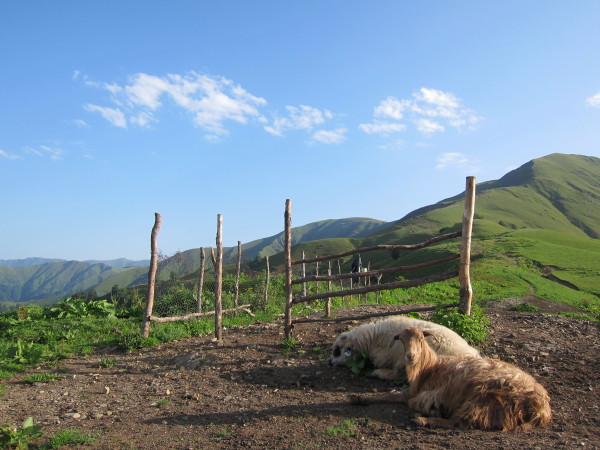
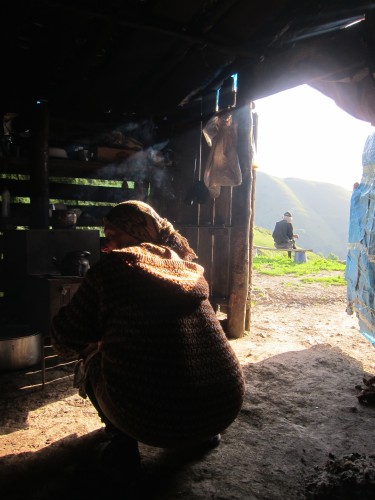
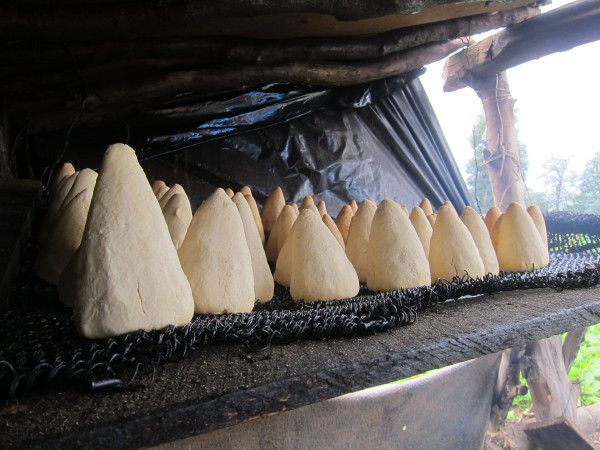
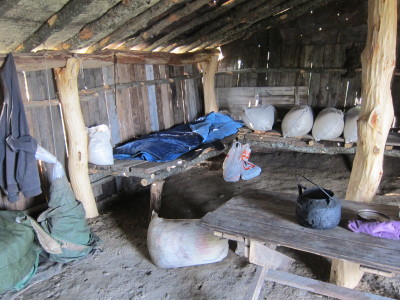
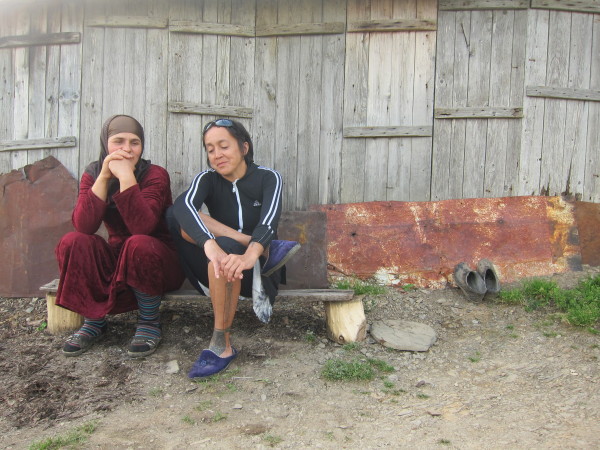
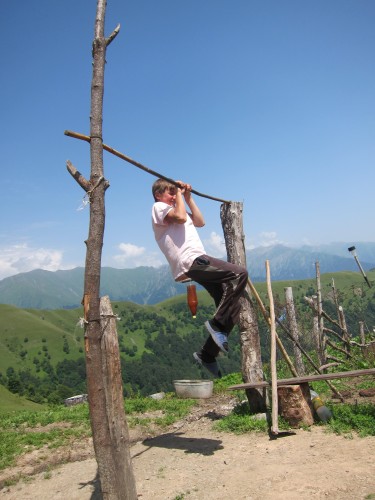
I love this! You really set the scene here. It’s a great article full of compassion. And paints a true, earthy picture of Georgia. Keep up the good work!
Hey Georgie – thanks for the kind words 🙂
Haha, we do not ‘only use it as dog food and to wash their dishes’ we call it ‘ Morz ‘ and use it as healing drink and by cookery as well :). I liked your narrative very much! Grüße aus Tschetschenien!
Oh, that’s interesting! I guess that part got lost in translation :). Thanks for clarifying!
maybe, but in pankisi, they dont drink it, i dont know why, so zig ash yu
Maybe you do not or did not ever in Pankisi, but we in Chechnya used it as detergent&purgation, as well as remedy against poisoning :).
Morza darban molura way doluch aghuora, pehash, kiira dika c’anbora cuo. Hinca k’ezig liela do i humanash. Doqqha Marshalla du!
So noxcho yaz pankisi ash yu, noxchicho xas mettigash dui?
Haaa, suna xo yewza:) Germaniera> Pankisi yean xasha! Devi, lomax khaza du boha ch’ogha, so-m khilla wac cig cqa a =(.As masseh link lo xuna, surt hottuora du-qh ax xayna lomara nohchiin mettigash muha yu :).
http://openkavkaz.com/che/testarhoy/#photos
http://chebers.livejournal.com/
http://timag82.livejournal.com/241916.html
cor del rez xil huna, so ax nemco ax indonesia yu, pankiseh ash yu, 5 sho, ingals mot dik xaa hun? fb yac hoeg?
Ingals mott dika ca khaa, jamosh wu so sayna. Cxa k’ezig nemco mott khaa.Fb yac, twitter yu as request yina xöga hinca, megar duy?).